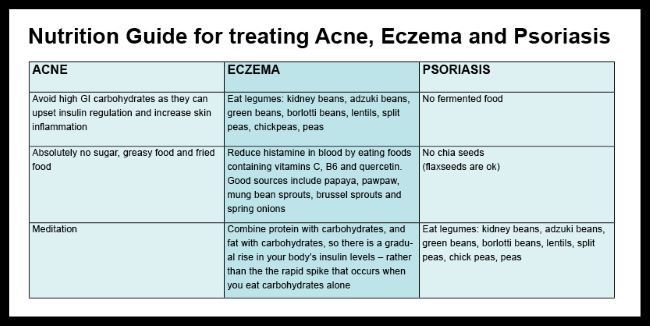With our skin being the largest organ in the body there is no wonder we put so much attention and love towards it.
However, at least half of the world’s population has experienced a challenging skin condition, such as acne, rosacea, psoriasis or eczema, in their life.
In recent years, researchers have identified a close link with our inner health and our skin health – as the old saying goes, “You are what you eat”.
So let’s look at how our choices in nutrition and lifestyle factors impact our skin health.
The triggers that affect our skin are many and varied and include hormones, stress and other emotional distress, metabolism, and genetics.
However, to truly ascertain how a client’s skin condition has manifested we must understand their health, including their diet and lifestyle choices, leading up to the initial onset of their skin condition.
Skin conditions such as acne, rosacea, psoriasis or eczema are each caused by unique underlying disharmonies, but inflammation is the common denominator in all skin issues, even if diet or the environment is a trigger.
Nutrition
Which foods are best avoided?
Generally, I would recommend the following foods be avoided:
- Acidic fruits/vegetables, such as oranges, tomatoes, lemons,
- Spicy/hot food
- Greasy/gatty Food
- Sugar-filled food
- Wheat/yeast products
- Dairy products
- Alcohol, soft drinks
- Cold food and drinks
- Gluten-containing grains such as wheat, barley, oats and rye
Foods to Enjoy
- Plenty of green vegetables
- Organic fresh produce as many healthy foods are sprayed with unhealthy chemicals which causes the food to be toxic for our health.
- Seasonal fruits – preferably organic and only what is in season
- At least two litres filtered water per day
- Lamb (seldom), Chicken, Fish, Turkey
- Almond or rice milk
- Cereals that are wheat and sugar free, such as rice flakes
- Pastas made from quinoa, brown rice and buckwheat
- Raw nuts such as walnuts and almonds but only 5-6 per snack as they can be difficult to digest

Lifestyle:
It’s important to reduce stress where possible as stress is a strong factor contributing to the exacerbation of eczema, psoriasis and acne. Ways to reduce stress (and therefore inflammation) include yoga, meditation and exercise.
Generally, exercise is a great way to assist in blood circulation so that treatments work more effectively. However, advise clients who haven’t exercised in a long time not to overdo it. They should start by walking and then build up their fitness gradually. It’s also very important to advise clients to shower after exercising as perspiration can irritate their skin and cause it to become more irritated if they allow it to remain on the skin for longer than 15-30 minutes.
It must also be stressed that smoking is detrimental to the health of the skin. The reason for this is that smoking is very drying to the skin which in turn obstructs the body’s natural ability to heal and rejuvenate. Drying the skin of any of these skin conditions will only contribute to flare ups. Therefore if your client is a smoker encourage them to look at options such as hypnosis, acupuncture and detox programs to quit.
Obviously there are many nutrition and lifestyle factors that can impact on a client’s skin condition. However the main focus should always be to encourage your client to make any necessary changes one at a time so they won’t feeling overwhelmed and will be encouraged to move forward. As new behaviours normally take around six weeks to become ingrained habits it is important to encourage them to stick to any change for at least two months ‒ they will be forever grateful for your guidance.
- Dr Irene Prantalos (Chinese Medicine) was diagnosed with psoriasis when she was just 11 years old and battled her way through adolescence and into early adulthood with the skin disease until she found a way to live free from psoriasis. She is now a healthy skin educator and the owner of Salubre Cosmeceuticals . For more information email info@salubre.com.au or phone (03) 9888 4129.

